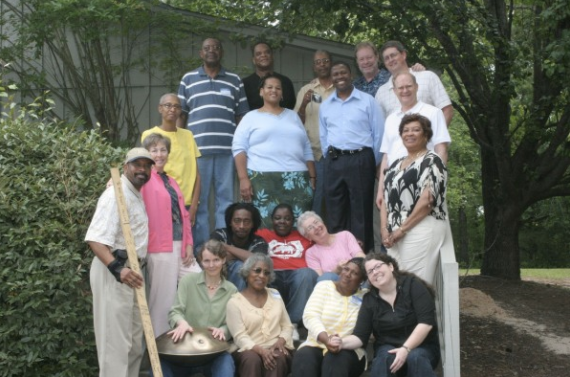William Winter Institute: ‘Mission is to end all discrimination’
Published 9:48 am Sunday, February 19, 2017

- The Winter Institute is based at Ole Miss with staff members living in Oxford, Jackson and McComb (winterinstitute.org)
Submitted by staff of The Winter Institute
On Friday, the Oxford Eagle published a column by Mr. Lee Habeeb headlined, “Winter Institute talks tolerance but practices intolerance.” As best we can tell, Mr. Habeeb’s concerns about the Winter Institute arose after hearing about our burgeoning collaboration with the Oxford School District on equity training for staff and dialogue groups for school stakeholders.
His column posed several skeptical questions about our values and our qualifications: “Who are they? What do they believe? Why are they training our teachers, and not someone else?”
The Winter Institute has 17 years of experience working with dozens of communities, so none of these questions are new to us. Most folks give us a chance to answer for ourselves at one of our public events or workshops. Or they’ll accept our invitation to talk over a cup of coffee.
Apparently Mr. Habeeb found out all he needed to know about us by cherry-picking staff members’ CVs and personal Facebook pages. We’re happy to take this opportunity to correct a few misrepresentations and fill in what he missed for those who are not familiar with our work.
First, who are we? The Winter Institute is a community-focused organization housed at the University of Mississippi. We were founded in 1999 to continue the racial reconciliation work begun by President Clinton’s One America initiative, co-chaired by former Governor William Winter. Then-Chancellor Robert Khayat chose to name the Institute after Governor Winter, who is still actively involved as our chairman emeritus. We currently have nine staff members who live in Oxford, Jackson, and McComb.
Second, what do we believe? Our mission is to end all discrimination based on difference, which includes race, ethnicity, class, faith, sex, sexual orientation, and gender identity.
We pursue anti-discrimination and equity through four main pillars of work: 1) fostering dialogue and growth with our Welcome Table process for communities and organizations; 2) teaching Mississippi high school students leadership skills and civil rights history at the Summer Youth Institute; 3) researching and translating the effects of state public policy decisions on Mississippi’s young people with Rethink Mississippi; and 4) training campus and community members how to recognize and remedy oppression in all its forms.
We believe that everybody deserves a seat at the table where they can listen to and be heard by others. In each facet of our work, we seek to bring together coalitions that span all brands of difference, including political ideology. To answer one of Mr. Habeeb’s concerns directly, the Winter Institute is a non-partisan organization because we believe that civil and human rights are non-partisan.
Most importantly, we believe that reconciliation cannot be imposed from the outside. We act as facilitators, but the outcomes of our work are driven by the participants themselves. For that reason, we do not partner with communities or organizations unless they expressly invite us to do so.
Finally, why are we the right ones to work with the Oxford School District? We have honed our methods by working with communities across the region and collaborating with partners around the globe, but Oxford has always been our home. One of our staff members is a graduate of the Oxford School District, and two are parents of current students.
Oxford’s growth and diversity are among its greatest strengths, but they also pose dilemmas about adapting to difference that, if unaddressed, can foster division and inequity. We are pleased that district leaders are serious about closing racial and socioeconomic gaps in student success, and we believe that we can help by creating spaces for honest conversation and imparting practical tools for understanding, navigating, and combatting bias.
Our staff may be small, but we possess a wide range of expertise and experience. What brings us together is a shared passion for the work and commitment to ending discrimination in a positive and respectful manner.
Mr. Habeeb’s column focused particular attention on one of our colleagues, Dr. Jennifer Stollman, the Institute’s Academic Services Director. In that capacity, she conducts trainings, dialogues, and consultations at UM and in numerous other academic and community settings. Like many of the Winter Institute’s programs, her workshops are often free and open to the public.
If Mr. Habeeb ever chooses to attend, he will learn, for instance, that implicit bias theory does not, as he wrote, “[state] that all white people are racists – and don’t know it.” Quite the contrary. It is the scientific understanding that everybody’s brain is hardwired to make snap judgments about people based on outward characteristics, such as skin color. By framing bias in terms of biology, Dr. Stollman’s trainings help people get past name-calling to think constructively about the causes and impacts of their actions.
Instead of reaching out in good faith, Mr. Habeeb found a way to view Dr. Stollman’s private Facebook posts, which he quoted selectively in his column. She often uses social media to encourage friends and acquaintances to be informed and self-reflective about bias. She also communicates about issues related to how we view and value each other as individuals and communities. Sometimes that includes opinions that Mr. Habeeb and others might not agree with, but we think it’s unreasonable to expect people who engage in the work of bridging disparate perspectives to surrender the right to express their own.
We invite members of the Oxford community to get to know us and our work firsthand by visiting our website www.winterinstitute.org and our Facebook page. If you are interested in learning about upcoming events and trainings, please call our office at 662-915-6734.
The guest column was submitted by Jake McGraw on behalf of the entire staff of The Winter Institute.





